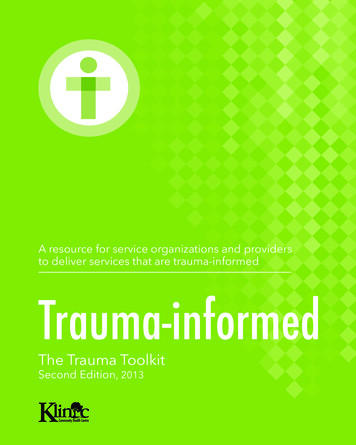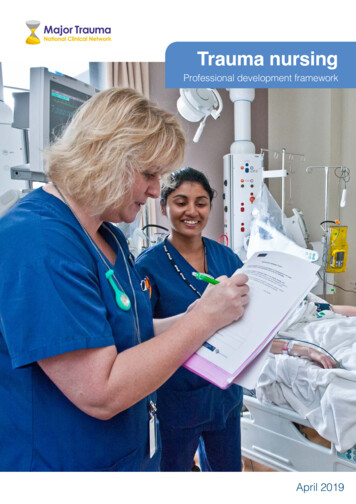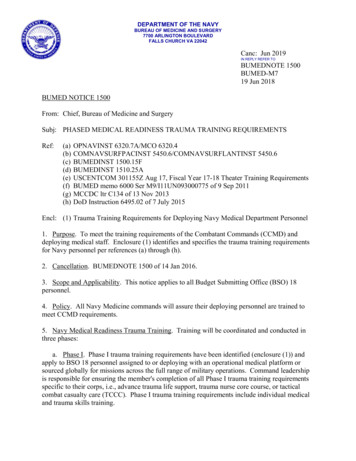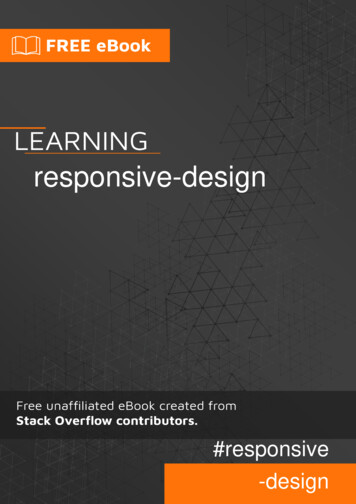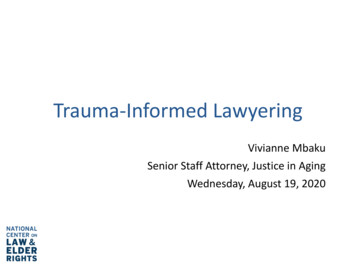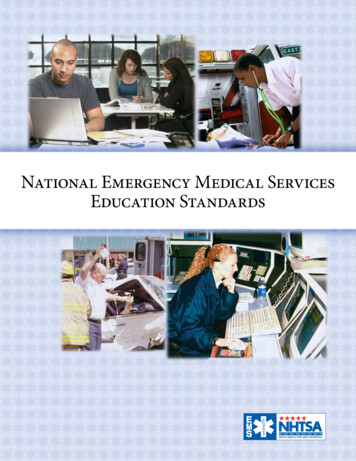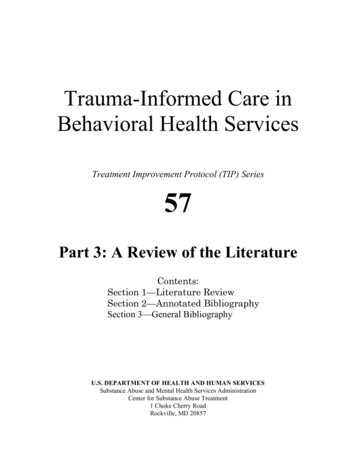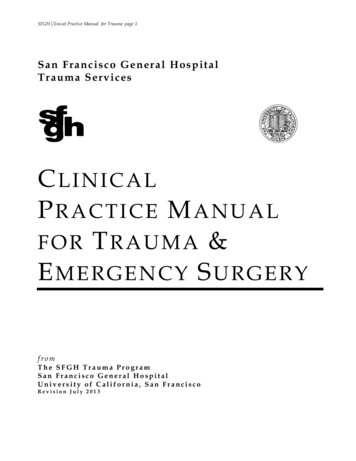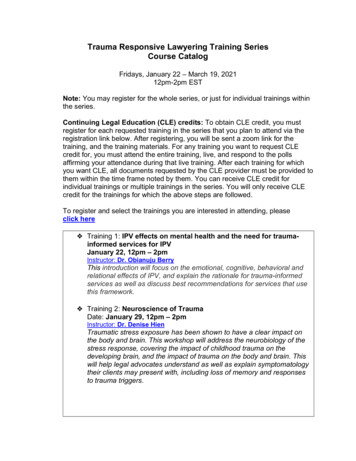
Transcription
Trauma Responsive Lawyering Training SeriesCourse CatalogFridays, January 22 – March 19, 202112pm-2pm ESTNote: You may register for the whole series, or just for individual trainings withinthe series.Continuing Legal Education (CLE) credits: To obtain CLE credit, you mustregister for each requested training in the series that you plan to attend via theregistration link below. After registering, you will be sent a zoom link for thetraining, and the training materials. For any training you want to request CLEcredit for, you must attend the entire training, live, and respond to the pollsaffirming your attendance during that live training. After each training for whichyou want CLE, all documents requested by the CLE provider must be provided tothem within the time frame noted by them. You can receive CLE credit forindividual trainings or multiple trainings in the series. You will only receive CLEcredit for the trainings for which the above steps are followed.To register and select the trainings you are interested in attending, pleaseclick here Training 1: IPV effects on mental health and the need for traumainformed services for IPVJanuary 22, 12pm – 2pmInstructor: Dr. Obianuju BerryThis introduction will focus on the emotional, cognitive, behavioral andrelational effects of IPV, and explain the rationale for trauma-informedservices as well as discuss best recommendations for services that usethis framework. Training 2: Neuroscience of TraumaDate: January 29, 12pm – 2pmInstructor: Dr. Denise HienTraumatic stress exposure has been shown to have a clear impact onthe body and brain. This workshop will address the neurobiology of thestress response, covering the impact of childhood trauma on thedeveloping brain, and the impact of trauma on the body and brain. Thiswill help legal advocates understand as well as explain symptomatologytheir clients may present with, including loss of memory and responsesto trauma triggers.
Training 3: RevictimizationDate: February 5, 12pm – 2pmInstructor: Dr. Kate WalshSurvivors of violence have increased vulnerabilities for re-victimizationand increase risk for mental health, physical health, social, occupational,and legal impacts for the same. Identifying these vulnerabilities willenable legal advocates to more fully respond to survivor’s needs, linkthem with supportive resources early on in their work with them, andunderstand a survivor’s reaction to re-victimization as it may appearthroughout our work with them. Training 4: Grounding and Verbal De-escalation ToolsDate: February 19, 12pm – 2pmInstructor: Dr. Farah HerbertThis session will provide skills on how to de-escalate clients who aredisplaying high levels of anxiety, stress, and hyper-arousal. Thiswebinar provides practical tools and exercises that lawyers can use withclients and examples of how to use them. Training 5: Safety AssessmentsDate: February 26, 12pm – 2pmInstructor: Dr. Elizabeth FitelsonThis session will apply information and skills gained in prior sessions tohelp advocates identify and respond to mental health crises and highrisk coping behaviors. This training is meant to focus on identification ofand understanding the reasons behind symptoms and behavior, and willalso address resources for clients. Training 6: Legal Work with Marginalized PopulationsDate: March 5, 12pm – 2pmInstructor: Margarita Guzman, EsqFor legal professionals, engaging marginalize populations is often amotivating purpose for attending law school. However, trauma-informedinterviewing and skills for engaging these populations is not a commonoffering in legal education. In this session, attendees will reflect on clientobstacles to successful engagement, participate in honest discussionabout unintentional behaviors that may distance clients, discuss racismand its impact on the systems in which we and our clients have toengage, and identify strategies that can help improve interpersonalconnections with clients, while maintaining healthful boundaries. Training 7: Vicarious TraumaDate: March 12, 12pm – 2pmInstructors: Rosa Regincos, LCSW and Dr. Tamar LevyWorking with IPV can lead to personal and professional growth.Moreover, it gives legal professionals the rewarding opportunity to work
with a resilient population capable of making enormous changes in theirlives. However, learning about cruelty, humiliation, abandonment,vulnerability and pain, and the devastating impact that abuse has onindividuals, families and societies is not free of challenges. The sameway abuse affects the individuals who have experienced it, working withIPV survivors can deeply transform the lives of legal providers workingwith them. This presentation will focus on providers’ response toworking with IPV survivors and individual and organizational strategiesto prevent and address providers’ responses to working withtraumatized clients, as well as burn-out. Training 8: Case Discussion of Trauma Informed Legal WorkDate: March 19, 12pm – 2pmInstructors: Sascha Griffin, PhD, Elizabeth Fitelson, MD and Shani Adess,EsqThis session will provide advocates with an opportunity to discuss casespecific questions (while maintaining confidentiality) to collaborativelystrategize how to respond to issues that may arise when servingSurvivors. It will give those present a chance to participate and observehow experts analyze and respond to various situations that may arise inclient representation.All trainings will be moderated by Shani Adess, EsqClick here to registerRegister in advance to receive training materials, the Zoom link, and CLE creditinformation. If you have any questions regarding this training, please contact IntegraFeliciano at integra.feliciano@nyulangone.org.Note: Recordings of trainings will be available for those who cannot attend live, thoughCLE will only be provided for live participants who meet eligibility requirements notedabove. CLEs will be provided for each individual training attended in compliance withthose requirements.This program is presented by The New York State Office of Victim Services in collaboration withColumbia University Department of Psychiatry and NYU Langone Department of Child and AdolescentPsychiatryCLE Sponsored by New York Legal Assistance Group
Course InstructorsTraining 1: IPV effects on mental health and the need for trauma-informedservices for IPVDate: January 22, 2021Instructor: Dr. Obianuju BerryObianuju “Uju” Berry, MD, MPH is the Medical Director ofNYC Health Hospitals Domestic and Gender-BasedViolence Mental Health Collaboration and Assistant Professorat NYU Langone within the Department of Child AdolescentPsychiatry. She is a graduate of Harvard Medical School, theJohns Hopkins Bloomberg School of Public Health, andColumbia University Psychiatry Residency and FellowshipPrograms. She is an academic researcher and clinician withclinical expertise in early childhood mental health, women'smental health, and trauma. She is experienced in mentalhealth research, public policy, and has worked with a variety ofstate and federal institutions, including the Centers for DiseaseControl and Prevention, the U.S. Department of Health and Human Services, and theNational Institute of Domestic Violence in the African American Community. During hertraining, she led a city-wide hybrid implementation effectiveness study on the evaluationof a mental health and intimate partner violence intervention with New York City’sMayor’s Office to End Domestic and Gender Based Violence (ENDGBV). Dr. Berry’sresearch focuses on implementation science, service delivery, and maternalintergenerational transmission and impact of trauma on child psychopathology
Training 2: Neuroscience of TraumaDate: January 29, 2021Instructor: Dr. Denise HienDenise Hien, PhD, ABPP, is Interim Dean of the GraduateSchool of Applied and Professional Psychology, Director andHelen E. Chaney Endowed Chair in Alcohol Studies of theCenter of Alcohol & Substance Use Studies at RutgersUniversity-New Brunswick. She also maintains longstandingadjunct appointments as Senior Research Scientist atColumbia University College of Physicians and Surgeons,Division on Substance Use Disorders and Adjunct Professorat the Graduate Center at the City University of New York.She and her group have conducted programmatic research onwomen’s mental health and addictions, with continuousfunding from the National Institute on Drug Abuse andNational Institute on Alcoholism and Alcohol Abuse (21 grantstotal: 7 R01, 2R25, 1 multi-site) for over 20 years. Considered a leader in the field, herbody of work (over 100 publications and 140 conference presentations) has contributedto the evidence base on the treatment of individuals with trauma-related psychiatricdisorders and their comorbidity with addictions, through conducting single- and multisite clinical trials across the United States in community-based substance abusetreatment settings. She is board-certified in clinical psychology (ABPP) and has servedas a standing member on the National Institute of Drug Abuse, NIH Institutional ReviewGroups and a health disparities advisory group to the NIDA Director on AsianAmerican/Pacific Islander issues.Dr. Hien received her B.A. in Psychology from Cornell University, and her M.S., M.Phil.and Ph.D. in Clinical Psychology at Teachers College, Columbia University. Shereceived her postdoctoral training in substance use research at the Division onSubstance Use Disorders at the Columbia University College of Physicians andSurgeons. Over her career, she has served on the doctoral and research faculties of theGraduate Center of the City University of New York, City College of New York,Columbia University School of Social Work, and the Derner School of Psychology atAdelphi University. Within each of these institutions, she has held numerous leadershiproles in academic and research administration.
Training 3: RevictimizationDate: February 5, 2021Instructor: Dr. Kate WalshKate Walsh, PhD, is an Associate Professor of Psychologyand Gender & Women's Studies, University of WisconsinMadison, and Director of the Sexual Violence ResearchInitiative at UW-Madison. She is a licensed clinicalpsychologist who earned her PhD from the University ofNebraska-Lincoln. She completed her T32-funded predoctoralinternship in Traumatic Stress at the Medical University ofSouth Carolina and her T32-funded postdoctoral fellowship inthe Department of Epidemiology at the Mailman School ofPublic Health at Columbia University. Prior to joining thefaculty at UW, she was an Assistant Professor at FerkaufGraduate School of Psychology at Yeshiva University and anAdjunct Assistant Professor in the Department of Epidemiology at the Mailman Schoolof Public Health at Columbia University. Her work focuses on risk factors for andoutcomes of gender-based violence, with an emphasis on translating findings intoeffective primary and secondary prevention programs. She also studies theintergenerational impact of violence exposure and has published on pathways frommaternal violence exposure and stress to poor fetal and offspring outcomes. She haspublished 74 peer-reviewed papers and 6 book chapters and has been funded by theNational Institute of Mental Health and the National Institute on Drug Abuse.Training 4: Grounding and Verbal De-escalation ToolsDate: February 19, 2021Instructor: Dr. Farah HerbertFarah Herbert, MD is a psychiatrist with the Family JusticeCenter of Brooklyn from NYC Health Hospitals Kings Countyand Clinical Assistant Professor at SUNY DownstateMedical Center. She completed her psychiatry residencytraining at NYU School of Medicine after obtaining her medicaldegree at Emory University in Atlanta, GA. Prior to joining theFamily Justice Center Mental Health Program, she wasmedical director of adult inpatient psychiatry at NYC H HKings County where she worked on initiatives to providetrauma informed care in acute settings and reduce use ofrestrictive interventions and workplace violence throughearly de-escalation and engagement. Her current clinical workfocuses on treatment of survivors of gender-based violence withpsychopharmacotherapy and trauma focused psychotherapy. Her work involves
collaborating with advocates, attorneys and other disciplines to provide holistic servicesin a unified setting for survivors.Training 5: Safety AssessmentsDate: February 26, 2021Instructor: Dr. Elizabeth FitelsonElizabeth Fitelson, MD is an Associate Professor ofPsychiatry and the co-founder and Director of the Women'sProgram in the Department of Psychiatry at ColumbiaUniversity Medical Center. She completed her medical trainingand residency at Columbia University/New York PresbyterianHospital, as well as a fellowship in Public Psychiatry at theNew York State Psychiatric Institute. Her area of clinicalexpertise includes the evaluation and treatment of psychiatricdisorders across the female life cycle, including perinatalpsychopharmacologic management, menstrual cycle andperimenopause related disorders, infertility, and pregnancyloss as well as trauma and the intersection of IPV and mentalhealth. Dr. Fitelson co-directs the Columbia PsychiatryDomestic Violence Initiative, a collaboration with the Chapman-Perelman Foundation,the Mayor’s Office to End Domestic and Gender Based Violence, and NYC Health &Hospitals, providing psychiatric care to domestic violence survivors at New York City’sFamily Justice Centers.Training 6: Legal Work with Marginalized PopulationsDate: March 5, 2021Instructor: Margarita GuzmanBorn in El Paso, Texas, Margarita Guzman is a queer Chicanaand survivor of intimate partner violence. She received herbachelor’s degree from Georgetown University and her lawdegree from George Washington University School of Law.Upon graduating from law school, Margarita established alegal clinic for indigent Spanish-speaking mental healthconsumers in New York City. Her legal practice later focusedon representing primarily Latinx immigrant survivors ofdomestic violence in housing, family and immigration legalmatters, as well as teen and young adult survivors. In 2013,she entered civil service at the Mayor’s Office to End Domesticand Gender-Based Violence, where she ran the Bronx FamilyJustice Center until joining the Violence Intervention Program (VIP) in 2017. Shecurrently serves as Executive Director at VIP, working with largely immigrant and low-
income Latinx survivors of domestic and sexual violence. As a survivor and a lawyer,Margarita has lived the limits of criminal and civil legal responses to violence and seeksto increase restorative and transformative justice practices to support survivors andchange abusive behaviors.Training 7: Vicarious TraumaDate: March 12, 2021Instructors: Rosa Regincos, LCSW and Dr. Tamar LevyRosa Regincos, MA, LCSW is a Licensed Master Clinical SocialWorker by New York State and an Assistant Professor in ClinicalPsychiatric Social Work at Columbia University, Psychiatrydepartment. Ms. Regincos is also a Clinical Psychologist licensedby the University of Barcelona', Spain.Ms. Regincos works in private practice in NYC treating adultswith and anxiety disorders and complex trauma. She integratestrauma, mindfulness, skills-based, cognitive-behavioral andpsychodynamic approaches. She is intensively trained inevidence-based trauma interventions with adults and childrentreatments. She is EMDR certified by EMDRIA.Her clinical interests include women’s mental health in theperinatal period and attachment trauma. She is part of the supervision and consultationteam for an initiative from The Mayor’s Office to Combat Domestic and Gender Violencein NYC and provides supervision to faculty at the Women’s Program at CU and lecturesto psychiatrist residents.Tamar Lavy, MD, ABIHM works as a psychiatrist on nativeLenape lands in NYC. She practices in the public sectorserving survivors of gender-based violence at the FamilyJustice Center in Staten Island. Her approach is grounded inknowledge of systems of oppression, psychodynamictheories, and dialogic peer-supported frameworks of care.She also offers collaborative person-directed drug taperingsupport to transgender and formerly incarcerated people. Herparticipation today honours her ancestors amongst whom areHolocaust, totalitarian communism, and military-related torturesurvivors, and ghetto uprising leaders. Tammy has additionalspecialization in Integrative and Holistic Medicine.
Training 8: Case Discussion of Trauma Informed Legal WorkDate: March 19, 2021Instructors: Sascha Griffin, PhD, Elizabeth Fitelson, MDSascha Griffin, PhD is a licensed clinical psychologistwho has extensive experience working with traumaexposed youth and adults, and currently works as thepsychotherapist at the New York City Health Hospitals Family Justice Center Mental HealthCollaboration program at the Staten Island FamilyJustice Center. Dr. Griffin has provided direct clinicaland supervisory services within acute care units,outpatient clinics, court-based clinics, residentialtreatment centers and domestic violence shelters. Shehas published several articles in peer-reviewed journalsthat address the interrelationships between traumaexposure and mental health concerns. Dr. Griffin received her Ph.D. in ClinicalPsychology from the University of Massachusetts at Amherst.Elizabeth Fitelson, MD is an Associate Professor ofPsychiatry and the co-founder and Director of the Women'sProgram in the Department of Psychiatry at ColumbiaUniversity Medical Center. She completed her medical trainingand residency at Columbia University/New York PresbyterianHospital, as well as a fellowship in Public Psychiatry at theNew York State Psychiatric Institute. Her area of clinicalexpertise includes the evaluation and treatment of psychiatricdisorders across the female life cycle, including perinatalpsychopharmacologic management, menstrual cycle andperimenopause related disorders, infertility, and pregnancyloss as well as trauma and the intersection of IPV and mentalhealth. Dr. Fitelson co-directs the Columbia Psychiatry Domestic Violence Initiative, acollaboration with the Chapman-Perelman Foundation, the Mayor’s Office to EndDomestic and Gender Based Violence, and NYC Health & Hospitals, providingpsychiatric care to domestic violence survivors at New York City’s Family JusticeCenters.
Shani Adess, EsqAssociate Director, Domestic Violence Law Unit, NYLAGShani is the Associate Director of NYLAG’s DomesticViolence Law Unit, and the Project Director of Project RISE.Shani works with survivors of domestic violence, abuse, andsexual assault, both adults and immigrant youth. In additionto her own practice, Shani supervises staff who serve thesepopulations through direct representation in matrimonial,family law, immigration law matters. Shani leads trainings andparticipates in panels in related substantive law; working withsurvivors of trauma and abuse; trauma’s psychological,physical, and physiological impacts; and provision of client-centered trauma-informedrepresentation. Previously, Shani was the Senior Supervising Attorney for SafeHorizon’s Immigration Law Project (Dec 2015 – August 2017), and an Advocacy andCommunications officer with Jesuit Refugee Services in the Southern Africa Region(2009-2010). Shani has a Bachelor of Arts Degree in International Relations fromEmory University and a JD from Georgetown University Law School in 2009.Training Sessions Moderator: Shani Adess, EsqShani Adess, EsqAssociate Director, Domestic Violence Law Unit, NYLAGShani is the Associate Director of NYLAG’s DomesticViolence Law Unit, and the Project Director of Project RISE.Shani works with survivors of domestic violence, abuse, andsexual assault, both adults and immigrant youth. In additionto her own practice, Shani supervises staff who serve thesepopulations through direct representation in matrimonial,family law, immigration law matters. Shani leads trainings andparticipates in panels in related substantive law; working withsurvivors of trauma and abuse; trauma’s psychological,physical, and physiological impacts; and provision of client-centered trauma-informedrepresentation. Previously, Shani was the Senior Supervising Attorney for SafeHorizon’s Immigration Law Project (Dec 2015 – August 2017), and an Advocacy andCommunications officer with Jesuit Refugee Services in the Southern Africa Region(2009-2010). Shani has a Bachelor of Arts Degree in International Relations fromEmory University and a JD from Georgetown University Law School in 2009.
Substance Use Disorders at the Columbia University College of Physicians and Surgeons. Over her career, she has served on the doctoral and research faculties of the Graduate Center of the City University of New York, City College of New York, Columbia University School of Social Work, and the Derner School of Psychology at Adelphi University.
